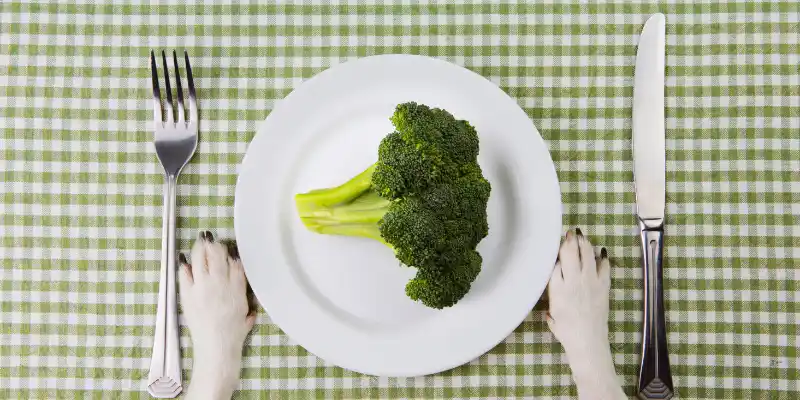What Vegetables Are Safe for Dogs?
Published: 4 Nov 2024
Hey guys!
Did you know that adding vegetables to your dog’s meals can significantly boost its health and well-being? If so, the question is, “What vegetables can dogs eat?”.
With so many choices available, it’s normal to feel overwhelmed. But don’t worry—finding safe and healthy vegetables for your beloved pet is simpler than you might think.
This guide will detail each safe vegetable, including its benefits, portion sizes, and serving instructions. Then, we will explore safe vegetables for allergic and sensitive dogs.
Let’s dive into the world of nutritious vegetables and find the perfect options to keep your dog happy and thriving!

Safe Vegetables For Dogs
When feeding your dog vegetables, knowing which ones are safe is essential. Vegetables contain important vitamins, minerals, and fiber that support your dog’s overall well-being. They can aid digestion, boost the immune system, improve eye health, and even help maintain a healthy weight.
Let’s uncover a variety of safe vegetables that your furry friend can enjoy!
- Carrots
- Green Beans
- Peas
- Sweet Potatoes
- Pumpkin
- Broccoli
- Cauliflower
- Spinach
- Zucchini
- Cucumber
- Bell Peppers (all colors)
- Celery
- Radishes
- Asparagus
- Brussels Sprouts
- Beet Greens
- Eggplant
- Mushrooms
- Kale
Now, it’s time to discuss the potential benefit and portion size in detail!
Carrots: Nature’s Dental Stick 🥕
Carrots are a popular choice among dog owners. They contain beta-carotene, which supports eye health. Dogs often enjoy the crunchiness of raw carrots, which can act as a natural toothbrush, helping reduce plaque.
To serve carrots, you can slice them into bite-sized pieces or steam them to make them softer and easier to chew. While carrots are generally safe, overfeeding can lead to digestive upset due to their natural sugar content.
Green Beans: The Weight Watcher’s Friend 🌿
Green beans are low in calories, which makes them excellent for weight management. Their fiber content helps keep your dog full while supporting digestion.
Green beans are packed with vitamins A, C, and K and are a good source of antioxidants. They are ideal for dogs needing extra hydration. They can be served fresh, cooked, or frozen. Always remember that canned beans with added salt or preservatives are not good for dogs.
Peas: Tiny Powerhouses 🍽️
Peas, including green, snow, and snap peas, are small, but these little gems boost energy and aid digestion. They are high in plant-based protein and fiber and contain essential vitamins such as B1, K, and C.
However, dogs with kidney issues should avoid peas due to their purine content, which can exacerbate the problem.
Sweet Potatoes: The Energy Booster 🍠
Sweet potatoes are a tasty, incredibly nutritious option. They are high in fiber, vitamins A and C, and provide essential carbohydrates for energy and antioxidants. Their natural sweetness makes them irresistible even for picky eaters.
Raw sweet potatoes are not safe for dogs. They can be difficult for dogs to digest and may cause digestive upset. Cooking them is the best way to make them safe for your dog.
While sweet potatoes are beneficial, moderation is key, as their natural sugars can contribute to weight gain if overfed.
Pumpkin: The Digestive Hero 🎃
Pumpkin is fantastic for soothing upset stomachs and promoting healthy digestion. Its fiber helps regulate bowel movements. It is particularly effective for dogs experiencing constipation or diarrhea.
Plain, cooked pumpkin is the best option. You can use fresh or canned pumpkin as long as it’s free from added sugar or spices. Pumpkin pie filling should be avoided, as it often contains ingredients harmful to dogs.
Broccoli: The Nutrient Dynamo 🥦
Broccoli contains vitamins and antioxidants, making it a powerful addition to your dog’s diet. It supports immune health and strong bones. Only give broccoli as an occasional treat due to its strong flavor that most dogs don’t like. Remove the stem and cook it thoroughly before feeding.
Broccoli does contain isothiocyanates, which can cause mild stomach upset if consumed in large quantities, so it’s best to serve it in small portions.

Spinach: The Iron Booster 🌱
Spinach is a nutrient-dense vegetable that provides iron, calcium, and antioxidants. It supports bone strength and a healthy immune system. To make spinach digestible, steam and chop it before serving. Spinach can be a nutritious addition to your dog’s diet, but it’s not a vegetable to rely on regularly.
| Did you know? |
|---|
You cannot feed spinach daily to your dog because they contain oxalate. When consumed in large amounts, oxalates can bind with calcium in the body, forming crystals known as calcium oxalate. These crystals can lead to health issues, particularly for dogs with kidney problems or those prone to bladder stones, which can interfere with calcium absorption. |
Zucchini: The Hydration Helper 🥗
Zucchini is another summer favorite that dogs can enjoy. It contains vitamins B6, C, and K, potassium, and manganese. Zucchini is low in calories and high in water, helping to keep your dog hydrated and healthy.
It’s gentle on the stomach and easy to digest. Zucchini can be served raw or cooked, but make sure it is plain and free of seasoning. Cut it into small, manageable pieces to ensure that your dog chews it easily without any choking hazards.
Cucumber: The Cool Crunch 🥒
Cucumbers are a refreshing choice, particularly during hot weather. They are low in calories and high in water content, helping to keep your dog hydrated. They contain vitamins K, C, and B6 that support eye health and the nervous system.
Cucumbers can be served raw and sliced into thin rounds or sticks. If your dog has trouble digesting the skin, it’s better to peel them first. Avoid pickled cucumbers, as the vinegar and spices used in pickling can be harmful to dogs.
Bell Peppers: Colorful Vitamin Boosters 🌶️
Bell peppers, particularly red ones, are a great choice for dogs. They are rich in vitamin C and antioxidants. They help reduce free radical damage and support cell health.
Remove the seeds and stems before serving. Bell peppers can be served raw or lightly cooked. However, spicy varieties like chili peppers must be avoided because they contain contain capsaicin. Ingesting capsaicin can cause stomach irritation, burning sensations, and digestive upset in dogs.
Celery: The Crunchy Freshener 🥬
Celery is a low-calorie vegetable with high water content. It’s great for hydration and has a fresh, crunchy texture. It also helps freshen your dog’s breath naturally. Celery is packed with vitamins A, C, and K and antioxidants.
Celery Supports eye health, immune function, and skin health. To serve celery safely, cut it into small, thin pieces to prevent choking hazards. Be cautious with the stringy fibers, which can be difficult for dogs to chew.
| Intersting Tip! |
|---|
You can use celery sticks as a dental stick or chew toy for small dogs. |
Radishes: The Zesty Treat 🌴
Radishes are crunchy, peppery, and rich in fiber and vitamin C. The crunchy texture helps to promote oral health by reducing plaque buildup and keeping teeth clean. Radishes contain glucosinolates that may support liver function and detoxification processes.
To serve, slice radishes thinly and offer them raw. Be mindful that some dogs may not enjoy spicy flavor, and excessive amounts can cause stomach irritation.
Asparagus: The Fiber-Rich Choice 🥬
Asparagus is nutrient-dense, offering vitamins A, C, K, and folate. It can be good for dogs’ kidneys because it’s low in potassium. It can also help treat ulcers that develop in dogs with kidney disease.
It contains compounds like asparagusic acid that support liver and kidney function, promoting detoxification. It’s a healthy vegetable when cooked properly. Steam or boil asparagus and cut it into small pieces.
Brussels Sprouts: The Antioxidant Boost 🌟
Brussels sprouts are packed with fiber and are high in antioxidants such as vitamins C and K, which help protect cells from oxidative damage and support the immune system. They help maintain heart health by reducing the risk of cardiovascular issues.
While Brussels sprouts are nutritious, they contain glucosinolates and isothiocyanates, which can cause gas and bloating in some dogs if fed in large amounts. So, portion control is important.
Kale: The Leafy Superfood 🌿
Kale is highly nutritious, containing vitamins A, C, and K, as well as calcium and antioxidants. It contains anti-inflammatory properties, which can help reduce chronic inflammation and support joint health in dogs.
But it also contains oxalates and isothiocyanates, which can cause mild digestive issues or kidney issues if consumed excessively. To serve kale, steam it or chop it finely when serving raw.
Mushrooms (Store-bought): The Safe Option 🍄
Store-bought mushrooms, like white button or portobello, are safe and nutritious. They’re rich in vitamin D and antioxidants such as selenium and B vitamins. They are best for dogs needing a low-calorie immune boost.
However, wild mushrooms can be toxic, so it’s essential to use only safe grocery store varieties. Cook mushrooms plain without oils or seasoning and serve them in small amounts. Overfeeding mushrooms may cause stomach upset, so portion control is important.
Cauliflower: The Gentle Giant 🥦
Cauliflower may look plain, but it’s far from boring. Its creamy texture and subtle flavor make it a soothing choice for dogs with sensitive tummies. The gentle fibers help cleanse their digestive system, making it a perfect addition to balanced meals.
Cauliflower is low in calories and high in vitamins C and K, along with fiber. Cooking cauliflower reduces its natural gas-producing compounds, making it easier for dogs to digest. Serve it steamed or boiled in small, manageable pieces to avoid choking.
Eggplant: The Velvety Delight 🍆
Eggplant provides a unique balance of fiber and antioxidants to support gut health and overall wellness. It also contains vitamins B6 and K and minerals, including magnesium and potassium. It supports brain function, blood clotting, and bone health.
| Did you know! |
|---|
Raw eggplant contains solanine, a compound that can be toxic in large quantities, especially for dogs with sensitivity. Cook eggplant reduces solanine levels. |
Pair the eggplant with herbs like rosemary or thyme for a burst of flavor your dog will love!
Beet Greens: A Superfood
Beet greens are highly nutritious, offering potassium, calcium, and iron. They are rich in nitrates, which may help improve blood flow and support heart health by maintaining healthy blood pressure levels.
It also contains antioxidants like beta-carotene and lutein that help fight free radicals, reducing the risk of cellular damage and chronic inflammation. However, they contain oxalates, which can interfere with calcium absorption.
To serve beetgreens, steam them and chop them into smaller pieces. While beneficial, beet greens should only be fed occasionally to avoid any potential health risks associated with their oxalate content.
You can read details on unique serving methods on our topic ” Can Dogs Eat Vegetables? “.
How to Introduce a New Vegetable to Dogs?
Introducing a new vegetable to your dog should be done gradually to ensure they tolerate it well. Here’s a simple process to follow:
- Start Small: Begin with a tiny portion, like a small piece or a teaspoon, depending on the vegetable and your dog’s size.
- Observe for Reactions: After feeding the vegetable, monitor your dog for 24-48 hours to check for any signs of discomfort, allergies, or digestive issues (vomiting, diarrhea, or gas).
- Introduce One at a Time: Only introduce one vegetable at a time to avoid confusion if any adverse reaction occurs.
- Cook if Necessary: Some vegetables, like sweet potatoes or squash, are easier to digest when cooked. Lightly steaming or boiling them can help.
- Check for Toxicity: Ensure the vegetable is safe for dogs. Avoid onions, garlic, and other harmful vegetables.
- Gradually Increase: If your dog tolerates the vegetable well, you can slowly increase the portion size over time.
- Mix with Regular Food: Incorporating vegetables into their meals can help them get used to the new flavor.
Following these steps will help your dog safely enjoy the benefits of new vegetables!
Conclusion:
So, guys, it’s time to wrap up. In this article, we discover what vegetables can dogs eat. I personally recommend starting with vegetables like carrots and green beans, as they are not only nutritious—packed with vitamins and fiber—but also generally well-received by dogs.
Always introduce new veggies gradually to prevent digestive upset and monitor your dog’s reaction to ensure they enjoy these healthy treats.
If you found this article helpful, please share it with fellow dog owners and encourage them to visit our website for more tips on keeping their pets healthy and happy!
FAQs
Here’s the list of the most asked questions about what vegetables dogs can eat!
Not all vegetables are safe for dogs. While many veggies are healthy options, some, like onions and garlic, can be toxic. Always research or consult your vet before introducing new vegetables to your dog’s diet.
You can serve vegetables raw, steamed, or cooked, but avoid using seasonings, oils, or additives. Cutting them into small, bite-sized pieces can help prevent choking and make them easier to chew. Always introduce them gradually to see how your dog reacts.
Vegetables should be given as an occasional treat rather than a main meal. They can make up 10-15% of your dog’s diet. Constantly adjust portion sizes based on your dog’s size and nutritional needs.
Yes, puppies can eat vegetables, but choosing safe options and introducing them slowly is essential. Their digestive systems are still developing, so monitor them for adverse reactions. Always consult your vet for tailored advice regarding your puppy’s diet.
Yes, vegetables can be a great low-calorie option for training treats! Cut them into small pieces to make them easy to handle and quick for your dog to eat. Just ensure your dog enjoys them and they’re safe to consume.
If your dog isn’t a fan of vegetables, don’t force them. You can try mixing veggies with their favorite foods or experimenting with different types. Patience is vital—some dogs may take time to develop a taste for veggies.
While vegetable juice or smoothies can be healthy, avoiding adding sugars or artificial ingredients is essential. Instead, focus on using pure, fresh ingredients and serving them in moderation. Always check with your vet before introducing new foods.
Vegetables aren’t essential for a dog’s diet but can provide additional vitamins, minerals, and fibre. A balanced diet of high-quality dog food should meet most nutritional needs. Always consult your vet for advice according to your dog’s health and dietary requirements.
Reference: https://veggiesinfo.com/best-vegetables-for-autumn-season/

- Be Respectful
- Stay Relevant
- Stay Positive
- True Feedback
- Encourage Discussion
- Avoid Spamming
- No Fake News
- Don't Copy-Paste
- No Personal Attacks

- Be Respectful
- Stay Relevant
- Stay Positive
- True Feedback
- Encourage Discussion
- Avoid Spamming
- No Fake News
- Don't Copy-Paste
- No Personal Attacks





